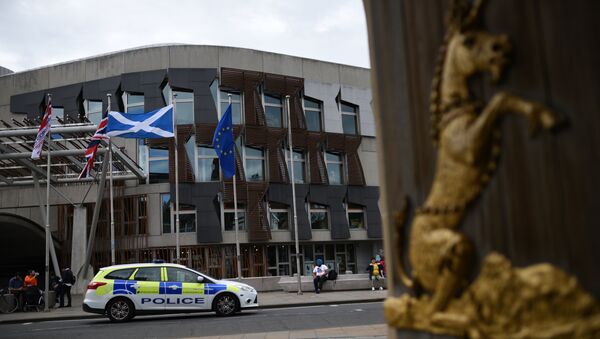In the June 23 Brexit referendum, Scotland and Northern Ireland voted in favour of remaining in the common market, whilst Wales and England supported separation from the EU.
Meanwhile, Scotland, significantly dissatisfied with its position within the UK, had unsuccessfully attempted a separation from Britain in autumn 2014. Given the newly-emerged trends, including higher oil prices after a two-year energy depression, and Scotland’s heavy ties with the continent in terms of trade in goods and services and labour mobility, another attempt at Scottish independence might be successful, the Scottish National Party (SNP) assume.
"It remains my view, and that of the government I lead, that the best option for Scotland remains full membership of the EU as an independent member state," Sturgeon claims. "Independence must remain an option for safeguarding our European status, if it becomes clear that our interests cannot be protected in any other way."
With Canary Wharf’s wariness towards Brexit expressed in the recent statements from the House of Lords, a threat of a second Scottish referendum might be a trouble for Westminster. Most of the UK’s North Sea oil production would go to the independent Scotland should the ‘indyref2’ succeed and whilst the UK’s manufacturing is in a weakened state through the challenges of the re-emerged isolationism, Scottish independence would be a hit to the UK’s economy.
Meanwhile, on Sunday, Trade Secretary Liam Fox said the UK could remain part of the single market after having severed the political ties with the EU. Ex-Chancellor of the Exchequer George Osborne, however, stated that it is in Britain’s best interest to maintain the closest possible ties with the EU.
Alex Salmond, the SNP foreign affairs spokesman, expressed confidence his party could win the second referendum as many Scots would prefer maintaining their European status to the social guarantees provided by the Westminster.
"The last time, when I was First Minister and embarked on this process, support for independence was 28 per cent." Salmond said. "After two years we ended up at 45 per cent … In a situation where the UK Government was determined… to sever our ties as a thousand-year-old European nation, then I think that would bring many people who were previously sceptical about independence to the Yes side."
PM May has reiterated she would consider the Scottish aspirations to maintain ties with the EU during the Brexit negotiations with Brussels, which are set to commence in March. However, should the Tories opt to initiate the Article 50 in spring 2017, thus triggering an obvious ‘hard Brexit’, more political turmoil could emerge on the SNP's part.
However, even if the May cabinet opts for ‘hard Brexit’, and Scotland votes to secede from the UK, it is unlikely that Westminster would be keen to maintain free trade with the newly-independent Scotland.
For now, Westminster is pursuing the most beneficial Brexit deal for the UK as a whole, which, however, gives the SNP more bargaining power as Edinburgh could claim the deal is still not good enough for Scotland regardless of its broader perception in the UK.
"We are committed as we leave the EU to getting a deal that works for the UK as a whole and that means a deal that works for Scotland as well, a deal that allows British firms maximum access to operate with the single market," Greg Swift, Pm May’s representative, said. "The UK as a whole will leave the EU."
In June 2016, Scotland voted 62pc to 38pc to ‘Remain’ in the EU, whilst in September 2014, it voted 55pc to 45pc to ‘Remain’ in the UK.




